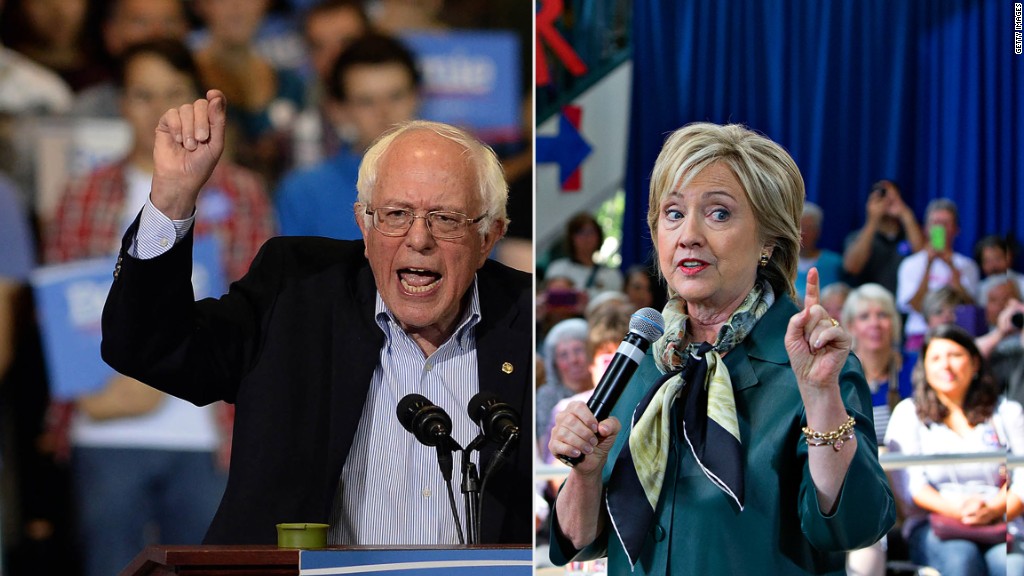
Bernie Sanders' plan sure sounds good: Make tuition free at all public colleges and universities. Expand Medicare to all Americans so no one would go without health insurance.
Rebuild Americans' crumbling roads, bridges, airports, public transit systems and ports. Create 1 million jobs for disadvantaged youth.
But the proposals would be pretty pricey, costing trillions of dollars.
How does Sanders want to pay for it all? He would turn to the wealthy, Wall Street and corporate America.
Sanders has laid out certain proposals, along with how he'd pay for them. But he's remained mum on what could be the costliest: universal health care.
Democratic presidential rival Hillary Clinton went on the attack this week, calling out Sanders for not releasing his health care plan and how he'd cover it. Her campaign is highlighting the 2013 health care bill that Sanders introduced in Congress, which would entail a 9% tax hike.
Sanders said Wednesday his plan would involve new fees, but did not provide details. He argues that his plan will lower the cost of health care for middle class families, partly because they wouldn't have to pay for private insurance.
Experts say neither candidate has provided enough details about their programs or their tax hikes on the wealthy to be able to confirm their estimates.
Responding to Clinton's accusations, Sanders re-released a list of his proposals of taxes and spending. But only some of his tax revenue estimates have been confirmed by government agencies and well-known think tanks. Some tax policy experts question how much you can really squeeze from the upper crust and corporations.
Related: Clinton vs. Sanders: The battle for the middle class
For instance, increasing the top income tax rate to 50%, from the current 39.6%, would only bring in an additional $96 billion in tax revenue, according to a recent analysis by the Brookings Institution. (Sanders has not suggested raising the top rate.)
"You could get more from the rich than we currently get, but it's not a bottomless pot," said Roberton Williams, senior fellow at the Tax Policy Center. Increasing taxes on the wealthy might yield a couple of hundred billion more a year, he said.
Let's look more specifically at Sanders' College for All plan.
"I want Wall Street now to help kids in this country go to college, public colleges and universities, free with a Wall Street speculation tax," Sanders said at Tuesday's Democratic debate on CNN.
Here's how it would work: The federal government would pay $2 in matching funds for every dollar states spend on making tuition free at public colleges and universities. Also, it would cut student loan interest rates to about 2% for undergraduates, and allow those with student debt to refinance at low rates. The pricetag: up to $750 billion over 10 years.
To pay for it, Sanders would impose a 0.5% fee on stock trades, 0.1% fee on bonds and a 0.005% fee on derivatives. This would raise up to $300 billion a year, according to Warren Gunnels, his policy director, citing a 2012 University of Massachusetts Amherst report.
But a Tax Policy Center report that looked at levying a 0.5% fee on stock trades -- along with an average 0.5% fee on bonds and 0.05% fee on derivatives -- found that it would only raise about $51 billion a year, said Steve Rosenthal, a Tax Policy Center senior fellow.
Gunnels called the center's report "conservative."
Related: The rich are paying more in taxes, but not as much as they used to
Another Sanders proposal is to invest $1 trillion over five years in infrastructure, which would not only repair roads and bridges but also put 13 million Americans to work. He'd fund it by making corporations pay taxes on the profits earned abroad or shifted offshore.
Under current law, a U.S. business would have to pay corporate taxes on profits it makes abroad only if it brings the money back to the United States. The company may take a foreign tax credit on its U.S. return for any taxes paid on those profits to another government. Gunnels pointed to a letter from a panel of 24 tax experts that said this policy costs the government $900 billion over a decade.
Sanders also wants to increase Social Security benefits and extend the entitlement's lifespan by subjecting income above $250,000 to payroll tax. (The current payroll tax threshold is $118,500.)
And he would create 1 million jobs for disadvantaged youth -- at a price tag of $5.5 billion -- by taxing hedge fund managers' profits at ordinary income tax rates. This tax proposal would bring in $15.6 billion over 10 years, according to the Congressional Joint Committee on Taxation.
It remains to be seen how Sanders would pay for Medicare for All, which could cost more than all his other programs combined.
CNNMoney Senior Writer Jeanne Sahadi contributed to this story.
Editor's Note: This story was originally published on October 15, 2016. It was updated to reflect recent comments by Hillary Clinton and Bernie Sanders.


